九年级英语全册 Unit 13 We're trying to save the earth! Section A Grammar focus 4a—4c(课件)(共16张PPT)
文档属性
| 名称 | 九年级英语全册 Unit 13 We're trying to save the earth! Section A Grammar focus 4a—4c(课件)(共16张PPT) | 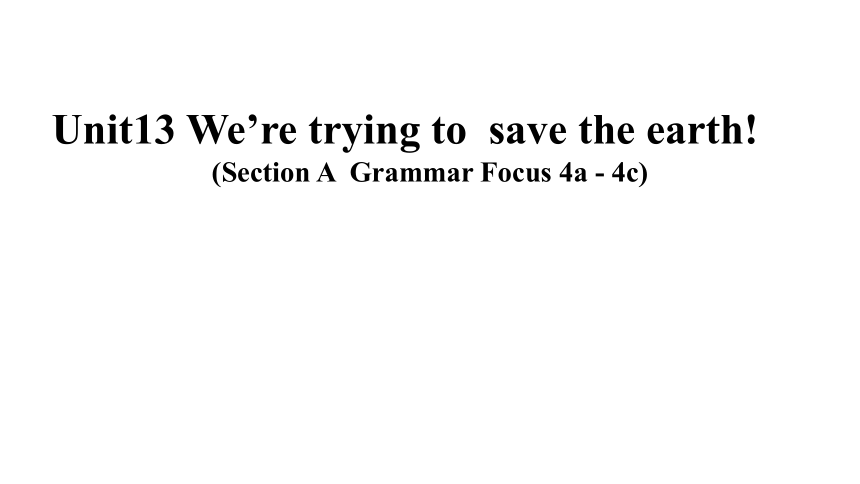 | |
| 格式 | pptx | ||
| 文件大小 | 2.7MB | ||
| 资源类型 | 教案 | ||
| 版本资源 | 人教新目标(Go for it)版 | ||
| 科目 | 英语 | ||
| 更新时间 | 2024-11-22 15:16:42 | ||
图片预览

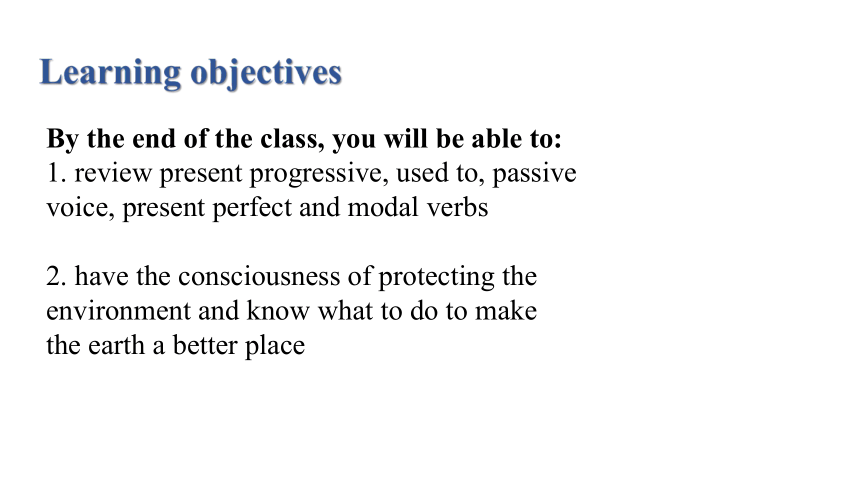
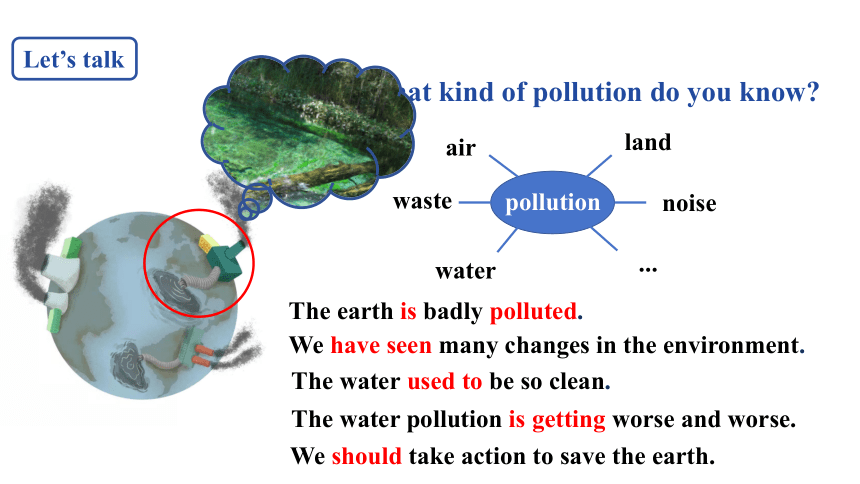
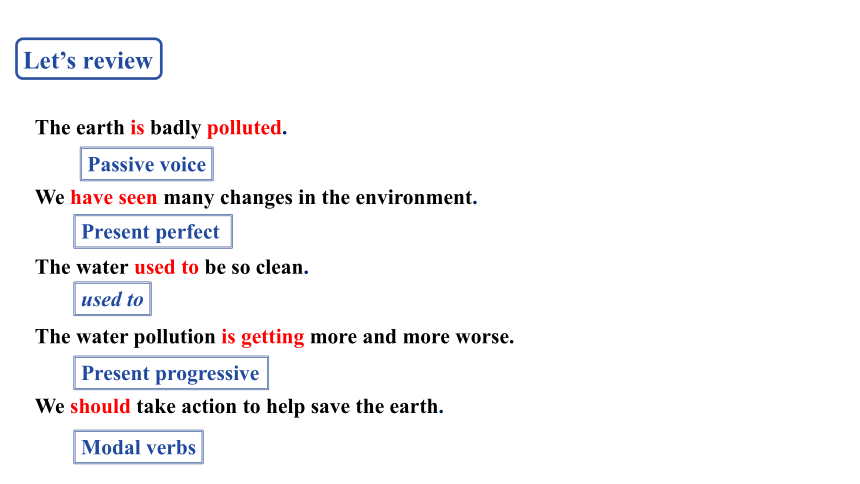
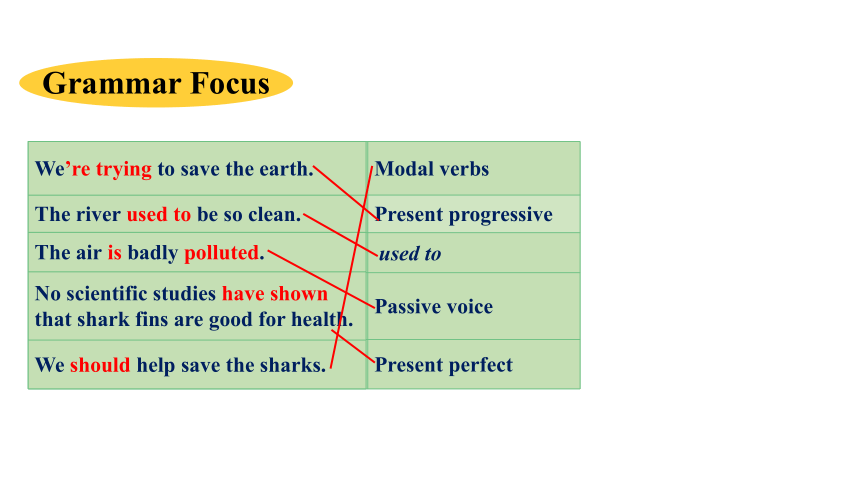
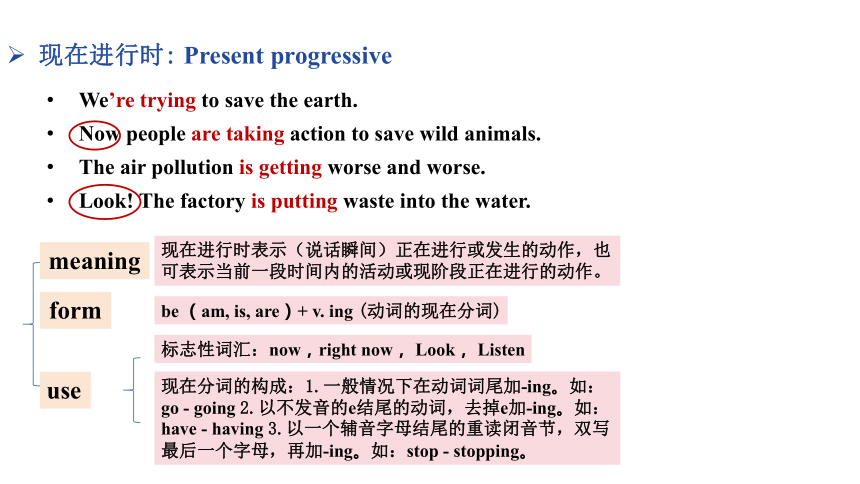
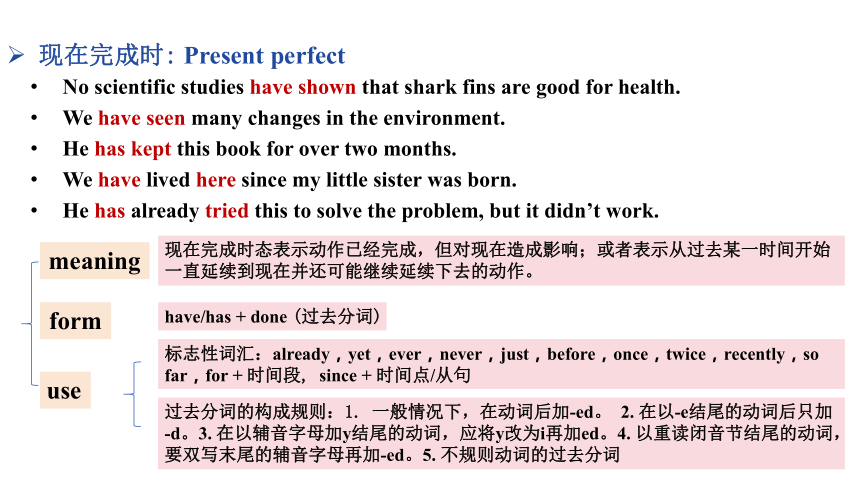
文档简介
(共16张PPT)
Unit13 We’re trying to save the earth!
(Section A Grammar Focus 4a - 4c)
Learning objectives
By the end of the class, you will be able to:
1. review present progressive, used to, passive voice, present perfect and modal verbs
2. have the consciousness of protecting the environment and know what to do to make the earth a better place
What kind of pollution do you know
Let’s talk
pollution
air
water
land
noise
waste
...
The earth is badly polluted.
We have seen many changes in the environment.
The water used to be so clean.
The water pollution is getting worse and worse.
We should take action to save the earth.
Let’s review
The earth is badly polluted.
We have seen many changes in the environment.
The water used to be so clean.
The water pollution is getting more and more worse.
We should take action to help save the earth.
Present progressive
Present perfect
Modal verbs
Passive voice
used to
We’re trying to save the earth. Modal verbs
The river used to be so clean. Present progressive
The air is badly polluted.
No scientific studies have shown that shark fins are good for health. Passive voice
We should help save the sharks. Present perfect
Grammar Focus
We’re trying to save the earth.
The river used to be so clean.
The air is badly polluted.
No scientific studies have shown that shark fins are good for health.
We should help save the sharks.
used to
现在进行时: Present progressive
We’re trying to save the earth.
Now people are taking action to save wild animals.
The air pollution is getting worse and worse.
Look! The factory is putting waste into the water.
meaning
form
use
现在进行时表示(说话瞬间)正在进行或发生的动作,也可表示当前一段时间内的活动或现阶段正在进行的动作。
be (am, is, are)+ v. ing (动词的现在分词)
标志性词汇:now,right now, Look, Listen
现在分词的构成:1.一般情况下在动词词尾加-ing。如:go - going 2.以不发音的e结尾的动词,去掉e加-ing。如:have - having 3.以一个辅音字母结尾的重读闭音节,双写最后一个字母,再加-ing。如:stop - stopping。
现在完成时: Present perfect
No scientific studies have shown that shark fins are good for health.
We have seen many changes in the environment.
He has kept this book for over two months.
We have lived here since my little sister was born.
He has already tried this to solve the problem, but it didn’t work.
meaning
form
use
现在完成时态表示动作已经完成,但对现在造成影响;或者表示从过去某一时间开始一直延续到现在并还可能继续延续下去的动作。
have/has + done (过去分词)
标志性词汇:already,yet,ever,never,just,before,once,twice,recently,so far,for + 时间段, since + 时间点/从句
过去分词的构成规则:1. 一般情况下,在动词后加-ed。 2. 在以-e结尾的动词后只加-d。3. 在以辅音字母加y结尾的动词,应将y改为i再加ed。4. 以重读闭音节结尾的动词,要双写末尾的辅音字母再加-ed。5. 不规则动词的过去分词
被动语态 Passive Voice
The air is badly polluted.
The river is polluted by factories.
The video was sent out quickly and was seen by many schoolmates.
In the future, robots will be used by more and more people.
Many more trees should be planted by us.
meaning
form
use
被动语态表示主语是动作的承受者。
主动语态表示主语是动作的执行者。
be + done (过去分词)
一般现在时被动语态:am/is/are + done
一般过去时被动语态:was/were + done
一般将来时被动语态:will be/is going to be +done
情态动词的被动语态:can/could/may/might/should/must + be + done
used to
The river used to be so clean.
James used to wake up late, but now he gets up very early.
Did Cherry use to live in Shanghai when she was a child
meaning
form
use
used to 表示过去常常做某事
否定句:didn’t used to,
一般疑问句: Did + 主语 + used to...
used to do 表示过去常常做某事
be used to doing 表示习惯于做某事
情态动词 Modal verbs
We should help save the sharks.
We should take action to save the earth.
Our actions can make a difference.
What can we do
to help save the earth
meaning
form
use
情态动词通常无人称和数的变化
情态动词有:can/could 能够;may/might可能、可以;need需要;have to 不得不;would 愿意、将要;shall 将(第一人称); should 应该;must 必须
情态动词后接动词原形
Let’s fill in the blanks with the appropriate modal verbs from the box first.
People _________ think that big things__________________ be done to save the earth. Many forget that saving the earth begins with small things. For example, you ______________ save electricity by turning off the lights when you leave a room. You _______________ also use reusable bags instead of plastic bags. I think it’s a great idea that you now _______ pay for plastic bags in some stores. And instead of driving to school or work, you _______________ ride your bike or walk. If it’s far, you __________ take the bus. All these small things __________ add up and become big things that ______________ improve the environment. Let’s take action now!
can
would
could
have to
should
must
may/
might
may/might
should/have to/must
can/could/should
can/could/should
have to
can/could/should
can/could
can/could
would/can/could
What can we do to save the earth
Let’s read and answer
Saving the earth begins with small things.
Let’s fill in the blanks with the correct forms of the verbs in brackets first.
Joe: _____ you ever _____ (take) part in an environmental project
Ken: Yes, I have. I _______ (help) with a Clean-Up Day last year. It was
__________ (consider) the biggest clean-up project this city______
ever ______ (have).
Joe: How many people ________ (take) part
Ken: I ______ (think) more than 1,000 people ______(come) to help out.
Joe: That’s fantastic! I guess everyone in this city is ______ (try) to
improve the environment.
Ken: Yes, we can’t afford to_______ (wait) any longer to take action!
Have
taken
helped
considered
had
had
took
think
came
trying
wait
What did Ken do to help save the earth
Let’s read and answer
Make a list of things that people can do to help the environment and discuss your list with your partner.
Let’s discuss
What small things can we do to help save the earth
problems small things that we can do
air pollution
use public transportation
A: I think that everyone should use public transportation.
B: I disagree. It’s difficult for parents with young children to use public transportation.
...
Standard: Excellent 5; Good 3; Acceptable 2; Needs improvement 1.
Self-check
Checklist Content Scores meaning form use
How much do you know about present progressive
How much do you know about present perfect
How much do you know about passive voice
How much do you know about used to
How much do you know about modal verbs
Total score: _____ Something you still needs to improve after class: _____________________________________________ Homework
Must do:
Make a mind map to review present progressive, used to, passive voice, present perfect and modal verbs (meaning, form, use)
Choose to do:
Make a list of things that people can do to help the environment
Thank you!
Unit13 We’re trying to save the earth!
(Section A Grammar Focus 4a - 4c)
Learning objectives
By the end of the class, you will be able to:
1. review present progressive, used to, passive voice, present perfect and modal verbs
2. have the consciousness of protecting the environment and know what to do to make the earth a better place
What kind of pollution do you know
Let’s talk
pollution
air
water
land
noise
waste
...
The earth is badly polluted.
We have seen many changes in the environment.
The water used to be so clean.
The water pollution is getting worse and worse.
We should take action to save the earth.
Let’s review
The earth is badly polluted.
We have seen many changes in the environment.
The water used to be so clean.
The water pollution is getting more and more worse.
We should take action to help save the earth.
Present progressive
Present perfect
Modal verbs
Passive voice
used to
We’re trying to save the earth. Modal verbs
The river used to be so clean. Present progressive
The air is badly polluted.
No scientific studies have shown that shark fins are good for health. Passive voice
We should help save the sharks. Present perfect
Grammar Focus
We’re trying to save the earth.
The river used to be so clean.
The air is badly polluted.
No scientific studies have shown that shark fins are good for health.
We should help save the sharks.
used to
现在进行时: Present progressive
We’re trying to save the earth.
Now people are taking action to save wild animals.
The air pollution is getting worse and worse.
Look! The factory is putting waste into the water.
meaning
form
use
现在进行时表示(说话瞬间)正在进行或发生的动作,也可表示当前一段时间内的活动或现阶段正在进行的动作。
be (am, is, are)+ v. ing (动词的现在分词)
标志性词汇:now,right now, Look, Listen
现在分词的构成:1.一般情况下在动词词尾加-ing。如:go - going 2.以不发音的e结尾的动词,去掉e加-ing。如:have - having 3.以一个辅音字母结尾的重读闭音节,双写最后一个字母,再加-ing。如:stop - stopping。
现在完成时: Present perfect
No scientific studies have shown that shark fins are good for health.
We have seen many changes in the environment.
He has kept this book for over two months.
We have lived here since my little sister was born.
He has already tried this to solve the problem, but it didn’t work.
meaning
form
use
现在完成时态表示动作已经完成,但对现在造成影响;或者表示从过去某一时间开始一直延续到现在并还可能继续延续下去的动作。
have/has + done (过去分词)
标志性词汇:already,yet,ever,never,just,before,once,twice,recently,so far,for + 时间段, since + 时间点/从句
过去分词的构成规则:1. 一般情况下,在动词后加-ed。 2. 在以-e结尾的动词后只加-d。3. 在以辅音字母加y结尾的动词,应将y改为i再加ed。4. 以重读闭音节结尾的动词,要双写末尾的辅音字母再加-ed。5. 不规则动词的过去分词
被动语态 Passive Voice
The air is badly polluted.
The river is polluted by factories.
The video was sent out quickly and was seen by many schoolmates.
In the future, robots will be used by more and more people.
Many more trees should be planted by us.
meaning
form
use
被动语态表示主语是动作的承受者。
主动语态表示主语是动作的执行者。
be + done (过去分词)
一般现在时被动语态:am/is/are + done
一般过去时被动语态:was/were + done
一般将来时被动语态:will be/is going to be +done
情态动词的被动语态:can/could/may/might/should/must + be + done
used to
The river used to be so clean.
James used to wake up late, but now he gets up very early.
Did Cherry use to live in Shanghai when she was a child
meaning
form
use
used to 表示过去常常做某事
否定句:didn’t used to,
一般疑问句: Did + 主语 + used to...
used to do 表示过去常常做某事
be used to doing 表示习惯于做某事
情态动词 Modal verbs
We should help save the sharks.
We should take action to save the earth.
Our actions can make a difference.
What can we do
to help save the earth
meaning
form
use
情态动词通常无人称和数的变化
情态动词有:can/could 能够;may/might可能、可以;need需要;have to 不得不;would 愿意、将要;shall 将(第一人称); should 应该;must 必须
情态动词后接动词原形
Let’s fill in the blanks with the appropriate modal verbs from the box first.
People _________ think that big things__________________ be done to save the earth. Many forget that saving the earth begins with small things. For example, you ______________ save electricity by turning off the lights when you leave a room. You _______________ also use reusable bags instead of plastic bags. I think it’s a great idea that you now _______ pay for plastic bags in some stores. And instead of driving to school or work, you _______________ ride your bike or walk. If it’s far, you __________ take the bus. All these small things __________ add up and become big things that ______________ improve the environment. Let’s take action now!
can
would
could
have to
should
must
may/
might
may/might
should/have to/must
can/could/should
can/could/should
have to
can/could/should
can/could
can/could
would/can/could
What can we do to save the earth
Let’s read and answer
Saving the earth begins with small things.
Let’s fill in the blanks with the correct forms of the verbs in brackets first.
Joe: _____ you ever _____ (take) part in an environmental project
Ken: Yes, I have. I _______ (help) with a Clean-Up Day last year. It was
__________ (consider) the biggest clean-up project this city______
ever ______ (have).
Joe: How many people ________ (take) part
Ken: I ______ (think) more than 1,000 people ______(come) to help out.
Joe: That’s fantastic! I guess everyone in this city is ______ (try) to
improve the environment.
Ken: Yes, we can’t afford to_______ (wait) any longer to take action!
Have
taken
helped
considered
had
had
took
think
came
trying
wait
What did Ken do to help save the earth
Let’s read and answer
Make a list of things that people can do to help the environment and discuss your list with your partner.
Let’s discuss
What small things can we do to help save the earth
problems small things that we can do
air pollution
use public transportation
A: I think that everyone should use public transportation.
B: I disagree. It’s difficult for parents with young children to use public transportation.
...
Standard: Excellent 5; Good 3; Acceptable 2; Needs improvement 1.
Self-check
Checklist Content Scores meaning form use
How much do you know about present progressive
How much do you know about present perfect
How much do you know about passive voice
How much do you know about used to
How much do you know about modal verbs
Total score: _____ Something you still needs to improve after class: _____________________________________________ Homework
Must do:
Make a mind map to review present progressive, used to, passive voice, present perfect and modal verbs (meaning, form, use)
Choose to do:
Make a list of things that people can do to help the environment
Thank you!
同课章节目录
- Unit 1 How can we become good learners.
- Section A
- Section B
- Unit 2 I think that mooncakes are delicious!
- Section A
- Section B
- Unit 3 Could you please tell me where the restroom
- Section A
- Section B
- Unit 4 I used to be afraid of the dark.
- Section A
- Section B
- Unit 5 What are the shirts made of?
- Section A
- Section B
- Review of Units 1-5
- Unit 6 When was it invented?
- Section A
- Section B
- Unit 7 Teenagers should be allowed to choose their
- Section A
- Section B
- Unit 8 It must belong to Carla.
- Section A
- Section B
- Unit 9 I like music that I can dance to.
- Section A
- Section B
- Unit 10 You're supposed to shake hands.
- Section A
- Section B
- Review of Units 6-10
- Unit 11 Sad movies make me cry.
- Section A
- Section B
- Unit 12 Life is full of the unexpected
- Section A
- Section B
- Unit 13 We're trying to save the earth!
- Section A
- Section B
- Unit 14 I remember meeting all of you in Grade 7.
- Section A
- Section B
- Review of Units 11-14
